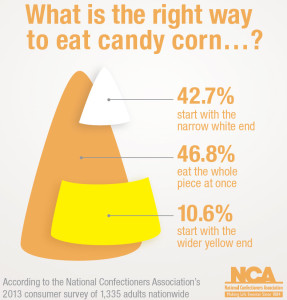Come on, ‘fess up. What do you do? Do you just randomly grab candy out of trick or treat bags – or are you more selective? If your kids go trick or treating, when they get home do you dump everything in the bag on the table and go through it to hunt down your favorites?
Like it or not – candy rules on Halloween. Adults may dread the easy accessibility of candy – it’s everywhere – but secretly, a whole lot of us can’t wait to get our hands on our favorite kid candy.
Americans buy nearly 600 million pounds of candy for Halloween. On average, we eat 24 pounds of candy a year, probably a whole lot of it right around this time. The most popular types of candy, in order, are: chocolate, chewy candies, and hard candy.
What Do You Go For First?
Trick or Treat Bags – plastic pumpkins and colorful bags loaded with a collection of sweet memories and some dental nightmares.
If you’ve ever swiped candy from your kid’s trick or treat bag, don’t feel guilty. According to the National Confectioners Association you’re certainly not alone. Ninety percent of parents confess they occasionally dip into their kid’s stash.
And they do it big time! Parents eat one candy bar out of every two a child brings home. Favorite targets are snack-sized chocolate bars (70%), candy-coated chocolate pieces (40%), caramels (37%) and gum (26%).
How Many Calories Are In That Rick Or Treat Bag — Or Pumpkin?
It’s been estimated that, on average, a child in the US collects between 3,500 and 7,000 worth of candy calories on Halloween night.
Mathematically, it takes around 3,500 calories to gain or lose a pound, so you’re looking at around a pound or two if you would choose to eat all of those mostly sugar and fat candy calories on top of your regular meals.
It’s Just One Night …
One evening of collecting (and eating) candy certainly isn’t going to make anyone overweight or obese. But a constant bombardment of candy, sweets, and other treats can certainly lead to weight and health challenges.
Try this. Have a talk with your family – or with yourself — ahead of Trick of Treating to plan on what to do the candy collection. Is it to be a one-day free for all and then the trash — or will the candy by doled out in measured amounts over a given period of time? Do what works for your family but it helps if the kids buy into the plan.
What’s amazing is that when kids are offered the option of choosing how much and what kind of candy to eat, most of them don’t go overboard – they make their selections, eat it, and that’s it. It then helps if the candy fades from sight. It can be doled out in smaller portions day by day – or it can magically diminish in quantity or disappear entirely – just not down the hatch of an all-too-willing adult.




